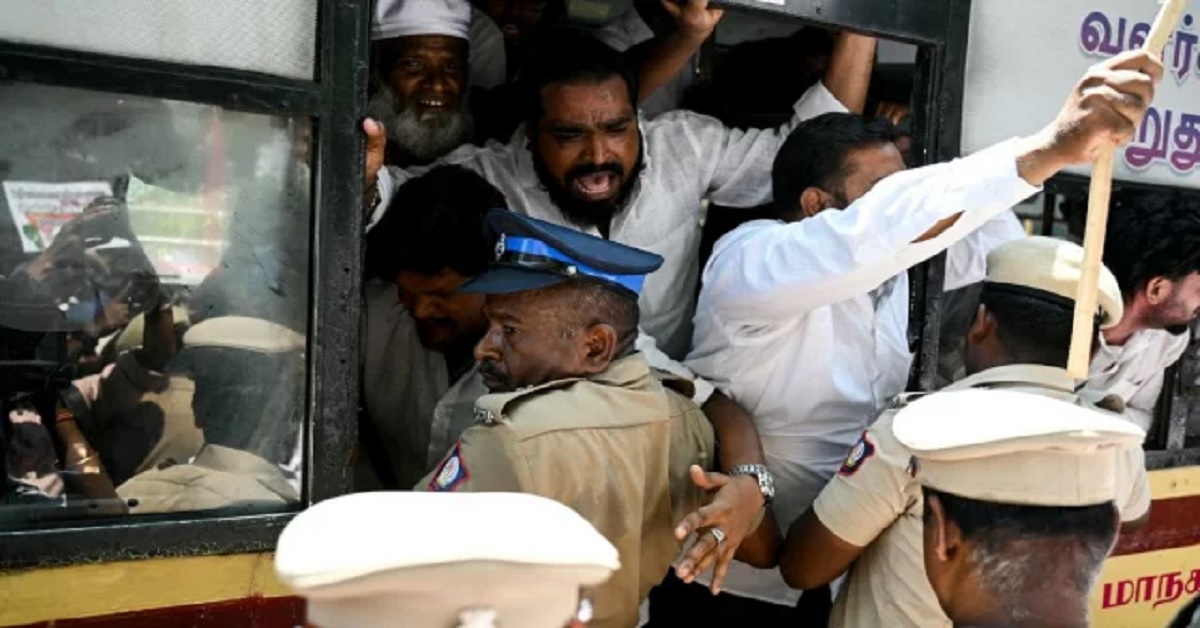Twenty-two individuals have been arrested following violent protests in West Bengal’s Murshidabad district against the newly enacted Waqf (Amendment) Act, police confirmed on April 9, 2025. The administration stated that the situation is now under control, with prohibitory orders under Section 163 of the Bharatiya Nagarik Suraksha Sanhita (BNSS)—equivalent to the old Section 144 of the CrPC—remaining in place around the Raghunathganj and Suti police station areas until 6 pm on April 10. Internet services in the Jangipur sub-division will remain suspended until 6 pm on April 11.
A heavy police deployment, including the Rapid Action Force, continues to maintain vigil across sensitive areas, particularly in and around Jangipur town, where the worst of the violence unfolded on April 8. Authorities have also intensified patrolling and naka-checking to prevent further unrest.
How the violence unfolded
The violence erupted on the afternoon of April 8, 2025, in Omarpur, under Raghunathganj police limits, when hundreds of protesters blocked National Highway-12 (NH-12) demanding a rollback of the Waqf (Amendment) Act, 2025. Clashes began after police attempted to disperse the crowd, leading to widespread stone-pelting and arson. At least five police vehicles were vandalised—two of which were set ablaze—and a firearm was reportedly snatched from a policeman.
According to official reports, nine people, including four police personnel, were injured in the violence. The mob allegedly shattered windows of vehicles and ransacked shops and houses near the protest site. Protesters refused to clear the highway despite repeated police warnings. In response, police resorted to lathi-charges and tear gas to disperse the crowd and regain control.
Government measures and public safety
In response to the unrest, Murshidabad District Magistrate Rajarshi Mitra passed an executive order imposing restrictions under Section 163 BNSS, prohibiting gatherings of five or more people in areas where there is a perceived threat to public order. State Home Secretary Nandini Chakraborty later issued an order suspending internet services in the entire Jangipur region until April 11 to prevent the spread of misinformation and communal tension.
Superintendent of Police Ananda Roy, who visited the violence-hit areas, confirmed detentions and ongoing operations to identify more suspects. “Some policemen were injured, including a deputy superintendent. Legal proceedings will follow against those involved in the violence and rumour-mongering,” he said, as per Hindustan Times.
Political fallout and divided reactions
The incident has sparked sharp political reactions. West Bengal Governor C V Ananda Bose condemned the violence and urged the state government to take “bold action” against those disturbing law and order. “Attempts to disturb public peace must be crushed with an iron hand,” he said, as per Times of India.
The opposition BJP was quick to blame the Mamata Banerjee-led state government for “minority appeasement” and deteriorating law and order. BJP state president Sukanta Majumdar claimed “violent Islamist mobs” were behind the riots and accused the administration of suppressing the truth by suspending internet services. He further alleged that Hindus were being targeted under the garb of protests.
Congress leader Adhir Ranjan Chowdhury held both the BJP and TMC responsible, accusing them of politicising the issue for communal gain. He criticised the police for their excessive force and demanded a more sensitive approach in a region where over 70 percent of the population is Muslim. Chowdhury warned against stoking further unrest in Murshidabad’s communally fragile landscape.
In contrast, Siddiqullah Chowdhury, a senior TMC leader and state minister, criticised the police crackdown. “Even during the Left rule, police never baton-charged minorities. If there was violence, action must be taken against the guilty. But lathi-charging an entire rally is unacceptable,” he said.
The Waqf (Amendment) Act and its wider impact
The Waqf (Amendment) Act, 2025—passed by the Lok Sabha and the Rajya Sabha after extended debates and signed into law by President Droupadi Murmu—officially came into effect on April 8. The law aims to allegedly modernise the governance of Waqf properties by enhancing transparency, ensuring better coordination between Waqf boards and local authorities, and safeguarding heritage assets.
However, it has been met with opposition from several Muslim organisations and political parties, who argue that the new provisions, especially the inclusion of non-Muslim members in Waqf boards, amount to undue interference in religious affairs. The opposition has labelled the law “anti-democratic” and accused the union of undermining the rights of religious minorities.
The Murshidabad incident is the most violent among a string of protests that have taken place in West Bengal and other states like Tamil Nadu. As per a report of Mint, BJP leaders circulated unverified videos allegedly showing protesters rejecting the Indian Constitution—claims that have been strongly contested by local groups.
Conclusion: Calm returns, but tensions linger
As of April 9, the police report that normalcy has been restored, with traffic on NH-12 resuming and no further incidents reported. However, prohibitory orders and internet restrictions continue to ensure preventive security. Authorities have promised strict legal action against those who instigated violence and against anyone spreading misinformation online.
The political and communal overtones of the protest continue to reverberate across West Bengal, revealing the deep polarisation around religious legislation. While the law has been enacted, the resistance to it—and the state’s handling of dissent—signals that tensions are far from resolved in Murshidabad and beyond.
Related:

